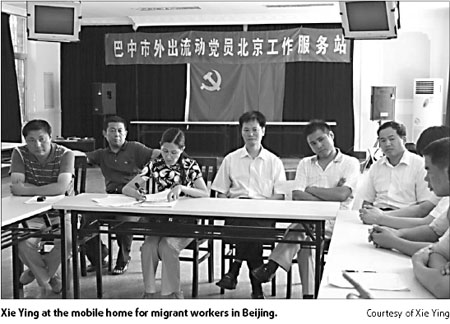
There is a bus terminal in the northern suburbs of Beijing that is familiar to migrant workers from Bazhong in Sichuan Province - it is where they either start the two-day trip back home or prepare to seek their fortunes in the capital.
The workers receive a free card from the terminal. A bus schedule is printed one side, while the other bears something a little more inviting: The mobile phone number of Xie Ying and the address of her "mobile home" of CPC members from Bazhong in Beijing.
Xie, in her 30s, was dispatched to Beijing by the CPC Committee of Bazhong in January. She rented a cheap apartment in suburban Fengtai district, found a person to work for her and began to look for Party members from her hometown.
It was important for the Party committee of the city, which is more than 1,500 km away from the capital, to have some kind of presence in the capital. On paper, Bazhong has a population of 3.7 million, but more than 1 million of them have left home and become migrant workers.
"Our city has long been an agricultural base, but farmers don't earn much money now, so many of them have become construction workers, factory workers, waiters, home servants and rubbish collectors in large cities such as Beijing, Shanghai and Guangzhou," Xie said. "In some villages, even the Party secretaries have left home."
Bazhong was home to several large factories in the 1960s, when central government worries about the possibility of a world war prompted authorities to move much of the country's heavy industry away from the coast. Most of these factories were not managed well, resulting in mass layoffs that left many searching for jobs.
With so many people, Party members included, leaving their homes, the structure of the Party is no longer complete in Bazhong. The city's Party committee is responsible for managing its members, while the Party members themselves must look after their political lives.
After much discussion, Party officials were dispatched to 10 different cities to build a mobile home of CPC members from Bazhong.
The first challenge of the mobile home was to find the missing members. Bazhong's Party committee estimated there were at least 20,000 Party members working in the 10 cities, though it had lost track of most of them.
In Beijing, Xie did not have much funding or even a car. As she searched for Party members from Bazhong, she would travel by bus from her office in the suburbs to visit people from her hometown and also members of Party committees in Beijing.
She also came up with the idea of distributing the card at the bus terminal. After much work, she has made contact with more than 770 Party members from her hometown. The members now meet regularly to study politics and attend events such as the Party's July 1 anniversary.
One thing Xie could not have expected was that many migrant workers from Bazhong now turn to her for help when they have trouble in Beijing. They are either Party members, are introduced by Party members or simply learn about her through the cards they get at the bus terminal.
In the past 20 months, Xie has dealt with 16 labor cases involving migrant workers from her hometown. Most of them hinge on delayed payments and compensations for injuries. She sometimes finds herself working around the clock for her disadvantaged comrades, but the happiness and pride she feels are evident in her voice when she talks about them.
In one case, 38 construction workers from Bazhong were introduced to Xie by Huang Yanbo, a Party member from the city who had learned about their miseries. These workers spent several months working on a project in Fengtai District, but never received 100,000 yuan ($12,800) in wages due. They signed no contracts and had no other evidence to support their case but a verbal agreement from the project manager.
To help them, Xie took the workers to meet with district labor authorities, and later found lawyers for them in Beijing. One day she spent so much time shepherding the workers around to various offices that she forgot to eat.
To show their gratitude, the workers, who survived on the most basic of diets, bought her some fruit, which they considered to be such a luxury that they declined Xie's offers to share.
With the help of local authorities, Xie finally got the workers more than 70,000 yuan. The workers wanted to give her 400 yuan, about a month's salary, but she declined.
"As children, we are told that if one has any trouble, one can always get help from the Party," Xie said.
"I am so happy that I have the ability to help these brothers and sisters because I have the Party behind me."
(China Daily 10/18/2007 page7)












